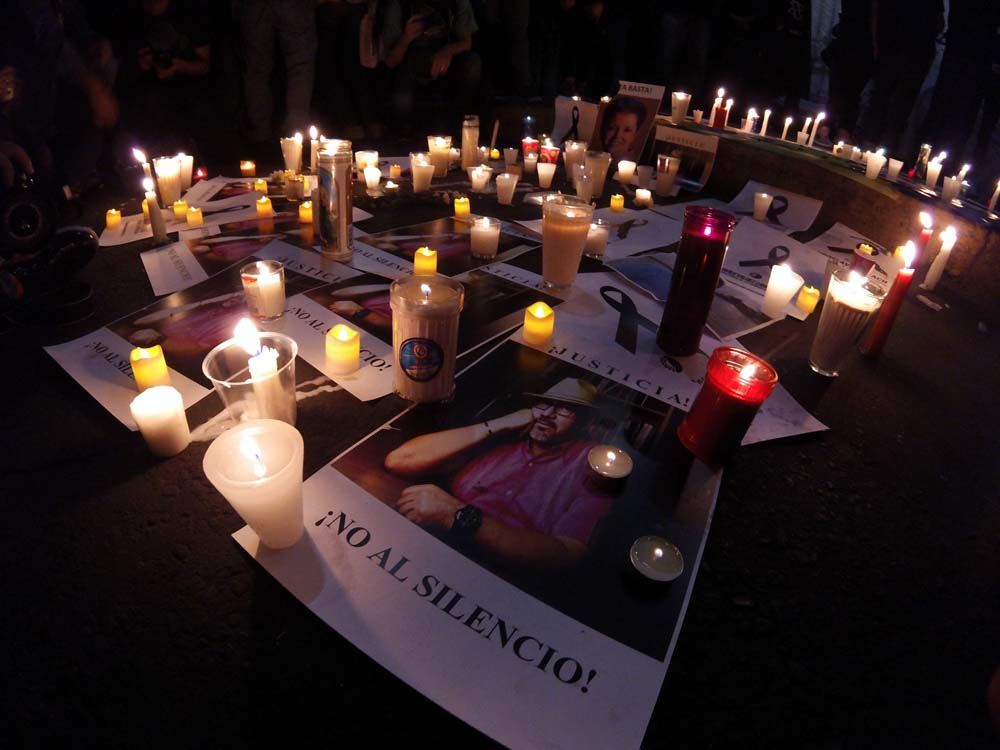A month ago today, Javier Valdez Cárdenas, a prominent Mexican journalist known for his work on drug trafficking and organized crime in Mexico, was shot to death in broad daylight in the Mexican state of Sinaloa.
Cárdenas’ murder, the sixth one of a Mexican journalist this year, was yet another reminder of the dangers facing reporters who cover the country’s drug trade. To draw attention to these risks, a handful of groups and publications, including our sibling publications Nieman Storyboard and Nieman Reports, are supporting a campaign today that encourages journalists in Mexico and around the world to write and share articles, editorials, videos, cartoons and other works that discuss Cárdenas’ murder, the dangers of reporting in Mexico, or journalist protection overall. The groups are asking that people tag their contributions with the hashtags #ourvoiceisourstrength or #nuestravozesnuestrafuerza.
“We want people to talk about what Javier’s work meant, but also these broader issues of violence and impunity and the government’s response to them,” said Carlos Lauria, senior program coordinator for the Americas at the Committee to Protect Journalists, which will hold a Facebook Live event on the topic later today. “This is a call to action.”
We spoke to Lauria about the campaign, the challenges of reporting in Mexico, and how the Internet is helping — and hurting — efforts there.
Ricardo Bilton: What’s the goal behind the #ourvoiceisourstrength campaign? Where does it fit within the mission at the Committee to Protect Journalists? Why Javier Valdez Cárdenas?
Carlos Lauria: Javier was a courageous journalist working in a very dangerous place in Mexico. Besides his courage, and obviously the fact that he was reporting about very delicate issues like drug trafficking and all the ways that the drug trade influences society, he did a tremendous work to tell the human stories that surround the violence. His work reflected the human face and the human stories of the tragedy that Mexico is going through. We want people to remember all that.
Bilton: You argue that, while journalists are the ones being targeted, these attacks are also disruptive to society as a whole. How so?
Lauria: You’re right — the problem has gone way beyond the press. It is a deep and profound freedom of expression crisis. It is a problem that is affecting fundamental human rights of all Mexicans — the right to freedom of expression, the rights to access information — that is creating serious difficulties for Mexican society to engage in a frank, direct open discussion about the issues that affect peoples’ daily lives. The inability of Mexicans to conduct this debate in an open, direct way because of the climate of fear and intimation that permeates Mexican society is obviously hurting the health of the Mexican democracy and creating instability.
Bilton: And this isn’t an issue in Mexico alone.
Lauria: Yes. The journalists are fulfilling a critical role everywhere in the world. They are informing people by providing the kind of information that people are using to make decisions about their lives. That information is being limited. There’s widespread censorship in many parts of the country. Entire communities are not being informed about whats going on. And a less informed society is a less democratic one.
Bilton: What do you see as technology’s role in this? What parts is the Internet making easier? Harder?
Lauria: The emergence of the Internet and technology have obviously created new ways of communication, but it also coincided with a crisis of the business model of mainstream media. In many areas around the world, there are more journalists reporting independently on blogs or on social media. Obviously, that has created serious challenges for many of these journalists and publications, because they do their work without the support of media institutions. So they are usually more vulnerable then their colleagues working for traditional media.
In areas where the state presence is weak and criminal organizations exert a lot of influence and there’s widespread censorship, social media networks and the Internet present us with an alternative for journalists to provide information to citizens, and for citizens to be informed. On the other hand, you have criminal networks using social media to influence coverage. The cartels are waging a war not only for turf, but also the control of information. The Internet is a weapon for them to influence coverage and to go after their rival groups and go after journalists too.
Bilton: What’s one digital tool or technique that you think more reporters should be using to protect themselves?.
Lauria: There are many tools. Encryption, for one, is vital. End-to-end encryption is one thing we strongly recommend for journalists working in dangerous areas. That would be a good place to start.
Photo of a Javier Valdez Cárdenas memorial by
ProtoplasmaKid used under a Creative Commons license.
